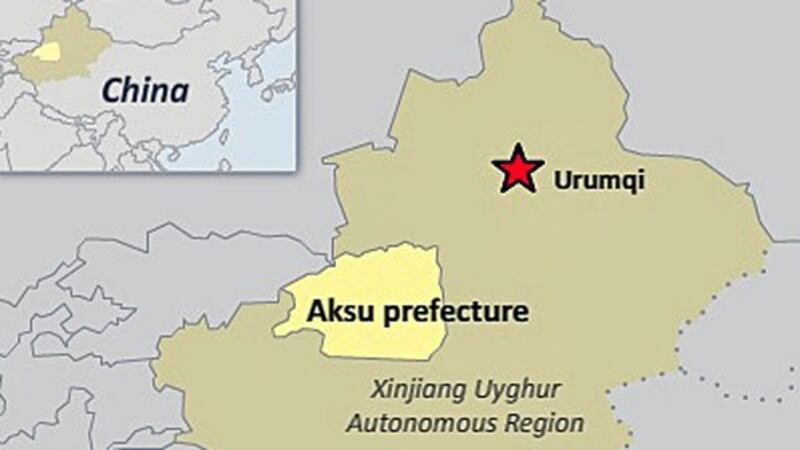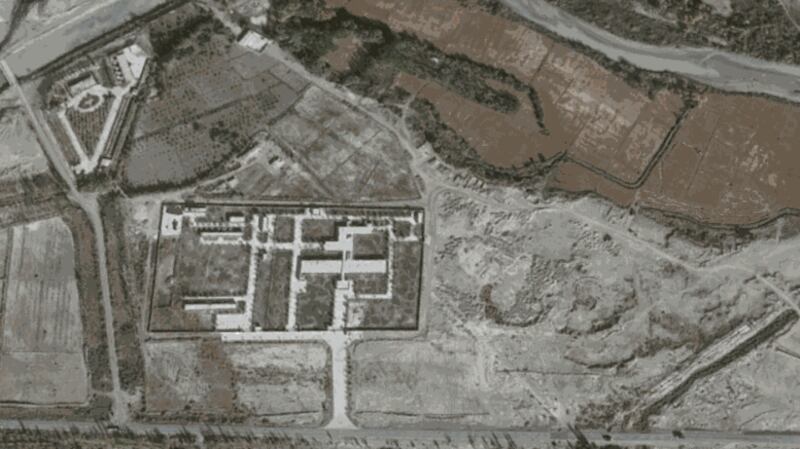A hospital for infectious diseases in Aksu (in Chinese, Akesu), in northwest China’s Xinjiang Uyghur Autonomous Region (XUAR), has been turned into an internment camp as part of what some experts believe could be a system for harvesting organs from detainees.
Last week, Bahtiyar Omar, the director of the Norway-based Uyghur Transitional Justice Database (UTJD), provided RFA’s Uyghur Service with images from Google Earth Pro that clearly show the construction of camps and associated factories outside of the seat of Aksu prefecture between 2017 and 2019.
The camps are part of a vast network of similar facilities throughout the XUAR where regional authorities are believed to have held up to 1.8 million Uyghurs and other Muslim minorities since early 2017. Amid increasing international scrutiny, authorities have begun to send detainees to work at nearby factories as part of an effort to label the camps “vocational centers,” although those held in the facilities regularly toil under forced or coerced labor conditions.
Based on the imagery provided by Omar, construction on the two camps outside of Aksu—a city of 660,000 people on the northern edge of the Taklamakan Desert—began in 2017, while the factory facility appeared nearby in 2018. He recently determined that one of the two camps was built and expanded on the site of what was formerly the Aksu Municipal Hospital of Infectious Diseases.
“If I put the coordinates into a map, I can see that [the hospital and camp] are located on the same site,” Omar said.
“The original hospital buildings were the only thing there in 2003. It was an old hospital, had a history of more than 20 years. Now, however, you can see that there has been a lot of construction there [since 2017].”
Last week, Omar had also pointed out imagery that showed a large cemetery located within a kilometer of the two camps containing a large building, which was later confirmed by RFA to be a crematorium, and parking lot that were built in the middle of the grounds in 2017. The lot sometimes contained dozens of white cars.
Additionally, a “green corridor” was built at the same time for the expedited transport of human organs at nearby Aksu Airport, an Oct. 14, 2017 report from the China Civil Aviation Network said, citing an official notice. According to the report, Xinjiang Medical University's organ transplant team was assigned to transport organs from the airport to the regional capital Urumqi on China Southern Airlines flight 6431 and completed seven trips in 2017, including to Hangzhou, the capital of eastern China’s Zhejiang province.

‘All in the same neighborhood’
The combination of facilities points to organ harvesting, said Ethan Gutmann, a fellow at the Washington-based Victims of Communism Memorial Foundation. Author of the book The Slaughter, he has long studied forced organ harvesting of political prisoners in China, including Uyghurs and Falun Gong adherents.
Gutmann suggested that the building and maintaining of the camps in Aksu, as well as the existing hospital infrastructure and construction of the green corridor, together allowed local authorities the ability to create a steady source of organs to harvest from Uyghurs.
“To me, that looks like organ harvesting: a large cremation center and a hospital that's connected to the camp directly,” he said.
“You extract the organs from the living human being, you let them die. The organs are strapped to this machine, this rather smallish machine, that's sitting there oxygenating them … Then the organs can have 20 hours of life, maybe 24 hours of life.”
Gutmann acknowledged that it is possible “they're just prepping these people for an operation” to be carried out in eastern China, but he said it is unlikely that a patient would travel such a long distance while under anesthesia.
“So that's enough time to get [an organ] to the airport to fly it over to the east coast of China,” he said.
“We knew they were building crematoriums. We knew that hospitals had to be nearby to the camps, so that one could perform the extractions. And now what we have is something which is all in the same neighborhood … That hospital, they do extractions, they administer death with a simple injection, they go to the cremation so there's no evidence.”
Gutmann noted that former camp detainees routinely detail having received DNA and blood tests upon their internment under the guise of a mandatory “universal health check,” but suggested the tests are “for tissue matching.”
And as for the infrastructure at the Aksu sites, such a system “speeds everything up … for higher margins of profit,” he said, adding that foreign “organ tourists” are willing to pay significantly higher prices for organs than Chinese citizens, meaning each detainee could be “worth” about U.S. $750,000 for their lungs, heart, kidneys, and liver.
RFA was able to contact a staffer at the Red Cross in Aksu, but he hung up the phone when asked about organ donations, saying he and the agency had “nothing to do with these matters.”
Other calls to health officials and hospitals in Aksu mostly went unanswered, although an officer with the Aksu Hospital of Infectious Disease’s security department told RFA that the facility is a “mixed hospital” and that patients “aren’t being admitted.” The officer said he didn’t know anything about surgeries or organ donations at the hospital.

‘We are very concerned’
While no public information about the Aksu Hospital of Infectious Disease has been posted online since 2017, a Oct. 29, 2016 report on the website of Zhejiang's Xinjiang Targeted Aid Network said that five doctors from the hospital were sent to Hangzhou for “special training” on cardiovascular techniques in March that year and were tasked with building related laboratories and upgrading the technical level of hospitals in Aksu on their return.
Another report published the following year by Zhejiang's “24-Hour Qianjiang Evening News” said a medical team from Hangzhou held a June 2, 2017 workshop on the topic of 3D simulations for organ surgery at the Aksu Provincial No. 1 People’s Hospital and quoted a Uyghur doctor from the Aksu Hospital of Infectious Disease as saying he had learned new techniques during the event.
Taken together, the reports suggest that local hospitals, including the Hospital of Infectious Diseases, received equipment and training for certain upper-chest conditions only in October 2016.
Hamid Sabi, a London-based lawyer who served as counsel to the China Tribunal on organ harvesting in 2019 and who testified at the 42nd session of the United Nations Human Rights Council in September last year that China was forcibly harvesting and selling the organs of Uyghurs, told RFA that the camp setup in Aksu raises deep concerns.
“This is very disconcerting, and we are extremely concerned about the reports that suggest an ongoing, and increased, forced organ harvesting among the Uyghur people,” he said.
“We understand that [they are targeting] young people around the age of 24 to 28, probably for the purpose of forced organ harvesting … We are very concerned, and we would like the audience to know that this is ongoing.”
He also noted the “commercial aspect” to forced organ harvesting and suggested that Uyghur organs might be sought after by patients in Muslim-majority countries because they are designated as “halal,” or belonging to a fellow Muslim who observes the dietary restrictions of the faith.
While RFA was unable to confirm the experts’ suspicions that the facilities in Aksu may be part of a state-sponsored network for harvesting the organs of Uyghurs, several former camp detainees have reported being made to undergo examinations of their internal organs and regular blood transfusions, while some have said that young cellmates in their 20s were escorted away by guards, never to be seen again.
Reported by Gulchehre Hoja for RFA’s Uyghur Service. Translated by the Uyghur Service. Written in English by Joshua Lipes.
